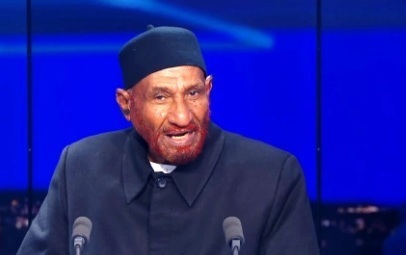Opposition leader urges to appreciate army role in Sudan revolution
May 1, 2019 (KHARTOUM) – Sadiq al-Mahdi, leader of the opposition National Umma Party called on the Freedom and Change negotiating team to not provoke their interlocutors from the Sudanese army during the power transfer process and to appreciate their role

“We shouldn’t provoke the army council by trying to deprive them of their legitimacy, deprive them of their positive role in the revolution,” he told AFP on Wednesday.
“We must not challenge them in a way that makes it necessary for them to assert themselves in a different way,” the veteran opposition leader added during a long interview with the AFP.
The military council on Tuesday denied claims they had planned to use force to remove the barricades made by sit-inners around the army headquarters and accused the opposition of denying their pledge to open bridges and allow trains traffic. They, also, accused the opposition of changing positions and confusing talks over transitional institutions.
In reply the Freedom and change forces dismissed there was an agreement with the army over the barricades saying they have to transfer power quickly to civilians if they want its removal. For the trains, they said the tracks are open after an understanding with the Sudan Railways Corporation.
The opposition leaders, emboldened by their revolutionary legitimacy, said that the army generals are now at the presidency (Republican Palace) thanks to the revolution and accused the army of seeking to keep power and expand their power. Further, they pointed out that such discussions have no place during the talks on the power handover.
Al-Mahdi said the statements of protest leaders have provoked the army pointing that some of their statements seem to belittle the army role in the revolution
He reassured that the army eventually has to hand over power but the discussions should be serious enough and present credible civilian government.
“They know if ultimately they settle for a military dictatorship, they will be in the same position as Bashir,” he said alluding to the international and regional isolation of the former Sudanese president.
The opposition leader who eulogized the decision of the arm to overthrow al-Bashir instead of killing protesters as he had ordered was optimistic about the end of the current deadlock in the talks.
“Within days we will achieve some kind of roadmap …but what we aspire for may take weeks,” said Mahdi.
“I assure you that ultimately this will be resolved because all of us have a great interest in making this revolution a successful story.”
On 30 April, the African Union’s Peace and Security Council extended the delay given to the Sudanese army to 60 days instead of 15 days.
The difference between the two sides is over the composition and power of the sovereignty council which will include military and civilian members.
(ST)

